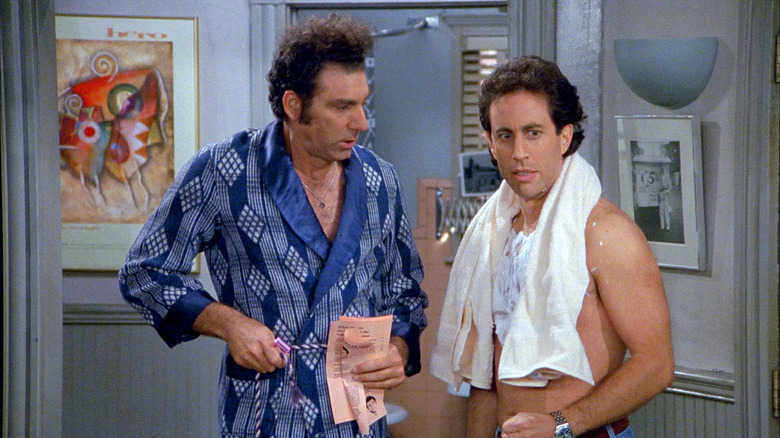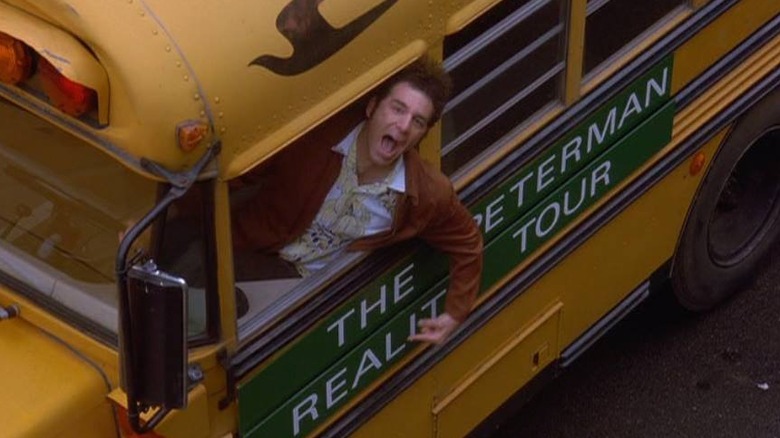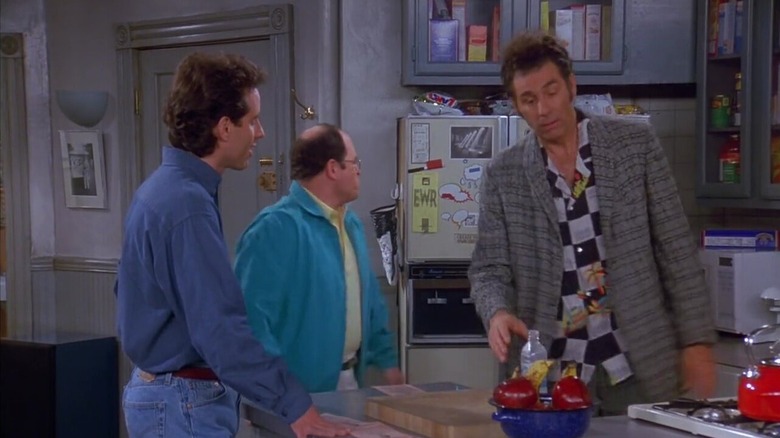A Seinfeld Subplot Was Inspired By The Real-Life Kramer
Most fans of Larry David's "Seinfeld" can tell you that Cosmo Kramer, the kooky, wealth-hungry character played by Michael Richards, was based on Kenny Kramer, a man that lives across the hall from David in New York in the 1980s. Kenny Kramer, as David described him, never had a single, notable career path, living on a long series of ambitious, unusual professions. Kenny managed a karate champion, sold electronic disco jewelry, worked as a drummer in a local band, and briefly did standup. David liked Kenny's eccentric habits of inventing weird devices, and his tendency to talk about hot tubs or fruits. Many of the stories on "Seinfeld" were inspired by actual schemes, careers, and ideas originally floated by Kenny Kramer, and David always felt he would make a good sitcom character. Cosmo Kramer has embodied David's neighbor ever since.
The "Seinfeld" episode "The Muffin Tops" (May 8, 1997) is an episode about plagiarism and stealing other people's ideas. In one story, Elaine (Julia Louis-Dreyfus) declares that she loves the top part of muffins, inspiring her boss, Mr. Lippman (Richard Fancy) to open a tops-only muffin bakery. In the B-story, Kramer discovers that a local author, J. Peterman (John O'Hurley) has taken stories that Kramer sold to him, and claimed them as his own.
Kramer tries to confront Peterman at a book signing, but he is ejected from the store. Kramer gets his revenge by starting the "Peterman Reality Tour," wherein he takes tourists for rides in a schoolbus, just so he can tell them the truth: Peterman's stories are 100% Cosmo Kramer.
This, of course, was inspired by something that Kenny Kramer had to do in response to the popularity of "Seinfeld." Kenny is not Cosmo, and he didn't exactly match the character played by Michael Richards. So, he began a real-life New York tour — called "Kramer's Reality Tour" — wherein he sought to separate himself from his onscreen analogue, one tourist at a time.
Kramer's Reality Tour was a reality
The story was told on the special features of the "Seinfeld" DVDs, and the show's writers (specifically Andy Robin) were impressed by the multiple layers of reality involved. Kenny Kramer inspired Cosmo Kramer, but then had to start a Reality Tour to point out the ways he was different from Cosmo Kramer. Then, in the fictional world of "Seinfeld," Cosmo Kramer found that he had inspired another in-universe character, and had to, likewise, start a Reality Tour to reinforce his identity. The fictional Kramer was now imitating the behavior of the real-life Kramer, but the real-life Kramer was only behaving that way because of the existence of the fictional Kramer. As Jerry Seinfeld said, it was "an incredible onion of reality and fiction."
Seinfeld noted that Cosmo Kramer was initially named "Kessler" in his show's pilot episode, as both he and Larry David knew that Kenny Kramer would happily exploit any associations he might have to the series. He would, as Seinfeld said, "become a complete pain. Which, of course, he did." David ultimately named the character after his old neighbor, and Kenny was pleased to exploit it as much as possible.
The DVD even features a video promo that Kenny filmed about his bus tour, openly acknowledging that he is exploiting his association with "Seinfeld." The show's writers, including Larry David, were merely amused at Kenny's attempts to cash in on his name, as they didn't feel there was much of a market for a Kramer Reality Tour. The tour included free pizza bagels and a series of very uninteresting stops where Kenny would tell amusing anecdotes. "It sounded like the worst hour-and-a-half anyone could ever spend," writer Spike Feresten said.
Michael Richards was afraid of Kenny's use of his image
Michael Richards recalls the Kramer Reality Tour well, and even related a story about how Kenny visited the set of "Seinfeld" and insisted on taking a picture of Richards in costume. The real Kramer and the fictional Kramer, face-to-face. It was cute, but Richards was suspicious of Kenny's incessant milking of fame. "It was so Hollywood," Richards said. Then, it seems, Kenny wanted Richards' legal permission to use the photo in personal publicity efforts, and Richards balked.
It wasn't until later that Richards and Kenny Kramer began to associate more positively, becoming friends. "I get it," Richards said, "It's okay. It's good." Richards didn't worry about Kenny exploiting the show. As far as he was concerned, it was no different from, say, a fan tour. "We got someone in New York working the show over. It was really enhancing the show, and bringing more attention to what we were creating. Kenny was really part of the team."
Kenny Kramer never wrote for "Seinfeld," but was vital to its creation, just by dint of his personality. Why not exploit the fact that your very existence inspired a writer to make one of the most popular sitcoms of all time? By all accounts, Kenny has a big, assertive, self-assured personality. He may have been as Seinfeld said, a "pain," but he was a master of his destiny. There's certainly something admirable about that.
A fun footnote to the episode "The Muffin Tops": it was about that time that Kenny decided to run for Mayor of New York, under the state's Libertarian ticket. He focused on the decriminalization of marijuana. He gave stump speeches. He received over 1,400 votes.


